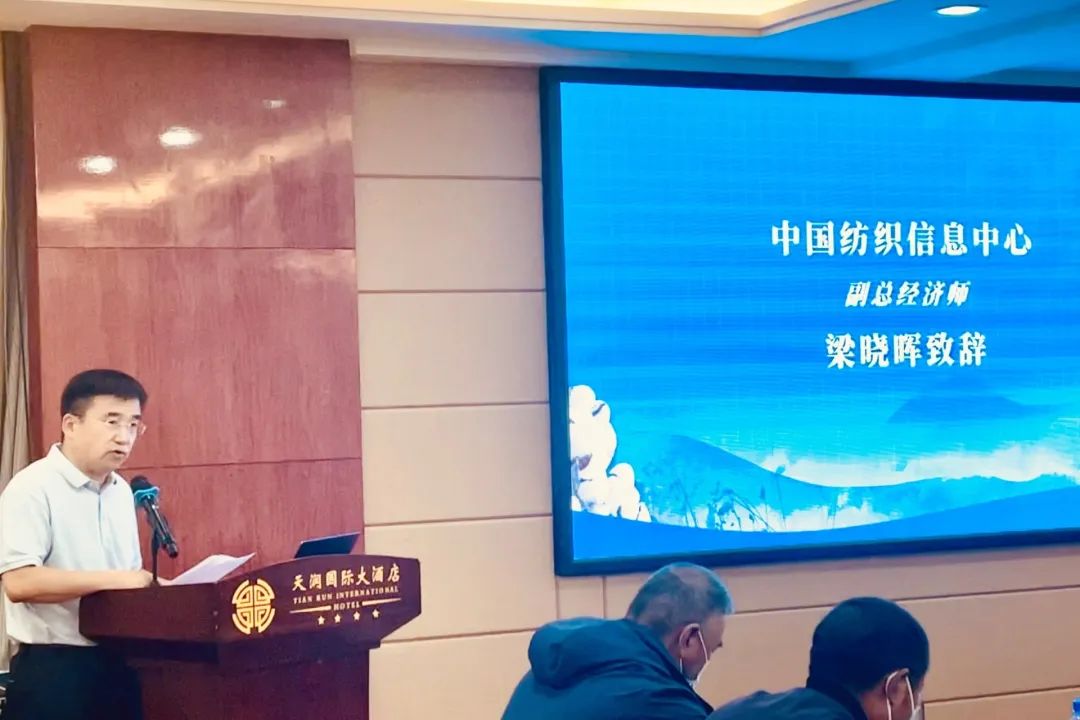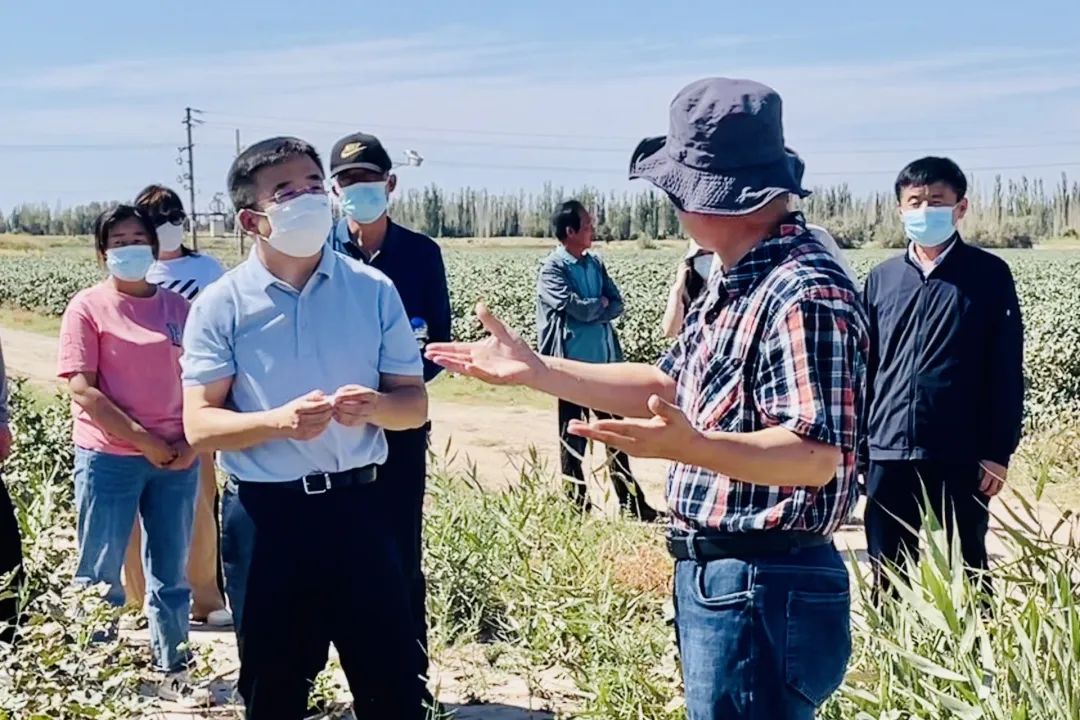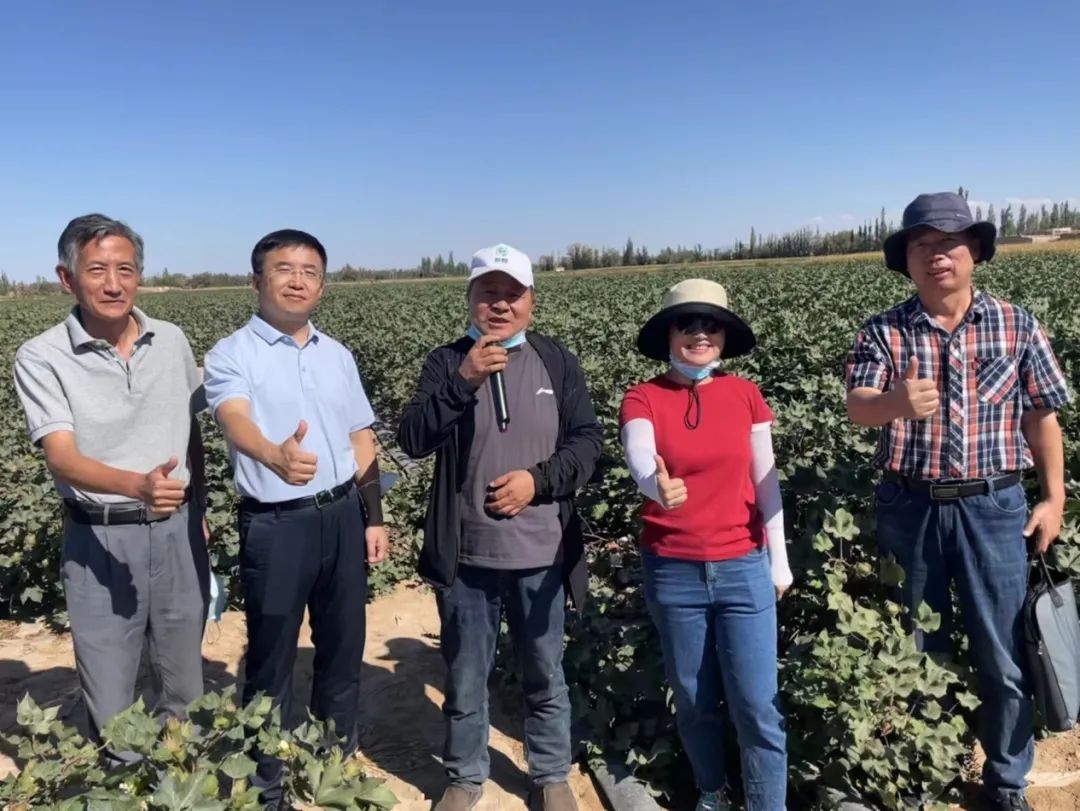On August 31, 2022, the Gansu pilot activity of the "Sustainable Cotton Framework" project ( the Meicun Fumin Project Sustainable Cotton Seminar and on-site observation activity)jointly carried out by the China Textile Information Center and the Hezhong Foundation, was held in Dunhuang. The pilot work is an important support for the development of the Sustainable Cotton Framework, which aims to serve multiple stakeholders, including cotton farmers, producers and brands, to enhance the economic, social, and environmental feasibility and sustainability of China's cotton value chain. Syngenta Group China and Dunhuang Agricultural Technology Promotion Center supported the activity.
At the seminar, the host introduced the progress of the project and the development of the Sustainable Cotton Framework, and relevant experts introduced the technology and procedures for the sustainable production of high-quality cotton, the China Modern Agriculture Platform (MAP), and cotton support policies, as well as the international experience in sustainable agriculture. In the afternoon of the observation activity of Donghu Farm and Yangjiapu demonstration field, the host also conducted a field demonstration of intelligent integration of water and fertilizer, and the participants had on-site exchanges with agricultural experts.
Mr. Yang Xudong, member of the Standing Committee of Dunhuang Municipal Committee and Vice Mayor of Dunhuang Municipal Government, addressed the seminar. He pointed out that since the beginning of this year, Dunhuang City has firmly regarded new agricultural technologies, breeds and equipment as the basic support and important grasp to increase agricultural production and income and boost rural revitalization. He fully affirmed the host's active commitment to provincial technical tests. The project has completed an experiment demonstration field of integration of cotton water and fertilizer, covering an area of 1500 acres. This effectively promoted the cotton industry in Dunhuang City to "improve quality, save costs and increase efficiency."
Liang Xiaohui, Chief Researcher of the Social Responsibility Office of China National Textile and Apparel Council and Deputy Chief Economist of the China Textile Information Center pointed out in his speech that actively creating industry sustainable standards and promoting cooperation with upstream and downstream participants in the textile and clothing supply chain in the fields of social responsibility and sustainability, thereby enhancing industry resilience, is the only way to achieve high-quality, and sustainable development in the industry. He hopes to build a bridge between high-quality sustainable cotton fields and cotton textile enterprises to achieve mutual benefit, create more economic and social value, and build a healthy business ecosystem that promotes common prosperity for cotton farmers in the beautiful rural areas of China, including Dunhuang.
As an important project co-organizer, Jiang Yekui, Chief Sustainable Development Officer of Syngenta Group in China, pointed out that the Meicun Fumin Project is an important measure for Syngenta Group to actively support agricultural sustainable development and set an example for it. The project showcases good green, efficient, and water-saving agriculture practices to frontline technicians through a demonstration farm established in Dunhuang. It also conducts training to encourage and guide farmers to adopt more sustainable ways to grow cotton and crop rotation. In the next step, by focusing on improving farmers' livelihoods, the project will research farmers' financial situation. It will explore establishing financial and insurance support models for local female farmers and new professional farmers. It will also try to link downstream ginning factories and clothing brands to actively assist in selling local cotton products and improve farmers' income multi-dimensionally. In line with global sustainability goals, the project will calculate cotton carbon footprint, form case study reports by developing sustainable planting plans for cotton and other crops, and publicize relevant achievements.
 At the seminar, Zheng Jian, Director of International Cooperation at the Social Responsibility Office of China National Textile And Apparel Council and Deputy Director of the Social Responsibility Research and Consulting Department of the China Textile Information Center, gave an overview of the Sustainable Cotton Framework. The Framework is guided by the United Nations Sustainable Development Goals, with CSC9000T (2018 version) and the Due Diligence Management Guidelines as guiding tools. It sets a series of goals for consumers, producers, and the planting- end and draws on the methods of Due Diligence Management. Based on the six-step approach of policy integration, identification and evaluation, response (termination, prevention, or mitigation), tracking, communication, and remediation, it identifies risk points in the cotton supply chain and carries out risk management and control.
At the meeting, representatives of cotton farmers who participated in the project also spoke. Lv Fengxia, the Female cotton farmer expressed the opportunities and difficulties she and other female cotton farming partners encountered during the planting process, such as the demand for agricultural products and technology, She also expressed her expectations for technical support to cotton farmers in the project.
At the meeting, Professor Feng Keyun, an associate researcher at the Crop Research Institute of Gansu Academy of Agricultural Sciences, gave a detailed introduction to sustainable production technologies and procedures for high-quality cotton, including breed selection, fertilizer, and water management, green prevention and control, happy cotton planting, fiber quality management, and so on. He Jing, the senior agronomist at Syngenta Group's China MAP, introduced the MAP model (modern agricultural service platform) of Sinochem Group and its progress, as well as its support and service policies for the cotton industry in Dunhuang and Guangzhou. Li Rusong, the head of the China office of the Hezhong Foundation, shared Hezhong's renewable agriculture projects in India and unmanned aerial vehicles in Brazil.
 At present, China is the world's largest producer and consumer of cotton. In recent years, China's cotton consumption accounted for one-third of the world's total cotton consumption. In 2021, the sown area will exceed 45 million acres, and the total output will exceed 5.7 million tons. The Hexi Corridor of Gansu Province is rich in light and heat resources, and the temperature difference between day and night is large, which is especially suitable for cotton growth. However, cotton cultivation is mainly in the mode of one family, the degree of mechanization is low, the water consumption is large, and the input cost is high. In order to help solve the practical problems faced in industrial development, improve cotton production efficiency, improve farmers' income, protect the ecological environment, and boost rural revitalization, the Gansu pilot project was launched. With the help of the MAP socialized service model, the project, relying on integrated technology of water and fertilizer as well as comprehensive plant protection and crop nutrition solutions, takes the Hexi Corridor area in Gansu Province as the core demonstration area to explore, summarize, and spread the implementation technology and experience model of cotton and rotation crop.
The pilot project in Gansu includes three main work directions: good practice, including organizing demonstration households for farmers, establishing demonstration farms, establishing field schools, conducting farmer training, optimizing community systems, and empowering women and youth; Market links, including exploring downstream markets for agricultural products, promoting local agricultural materials markets, agricultural financial services, and so on; Policy recommendations include developing plans of standard cotton planting to assist Syngenta Group China in achieving carbon neutrality goals, summarizing good practices, and providing recommendations for local policies in the areas of climate change and rural revitalization.
 |
